外研版七年级下册module3-4专项语法--一般将来时
七年级外研版下 语法专项复习(M3、M4)

七年级外研版下语法专项复习(M3、M4)Module 3和Module4:一般将来时一、一般将来时的构成:1. be going to + 动词原形2.情态动词will + 动词原形二、Be(am,is,are)going to (将要/计划/打算做某事),后加动词原形当主语是I 时用am ;当主语是第三人称单数时用is;当主语是you或复数时用are。
如:I am going to buy something tomorrow morning.明天早上我要去买些东西。
She is going to see Mr. Wang this afternoon.她打算今天下午去看望王先生。
We are going to have a picnic this weekend.这周末我们打算去野餐。
(1)肯定句:主语+be going to +动词原形+其他。
如:我打算去广州。
I am going to Guangzhou。
(2)否定句:在be动词后加not(主语+be not going to +动词原形+其他。
)如:我不打算去广州。
I am not going to Guangzhou。
(3)一般疑问句:把be动词放句首(Be+主语+going to +动原+其他?)肯定回答:Yes,主语+be动词。
否定回答:No,主语+be动词+not.如:你打算去广州吗?Are you going to Guangzhou?是,我打算去。
Yes,I am. 不,我不去。
No,I am not.(4)特殊疑问句:特殊疑问词+一般疑问句(Be+主语+going to +动原+其他?)如:你打算什么时候去广州?When are you going to Guangzhou?三、will(将要),是情态动词,后加动词原形,常与tomorrow(明天),next month(下个月),in two days(两天后)等连用。
初中英语外研版七年级下册M3U3知识点讲解

七年级英语下册M3U3知识讲解【语法】语法:一般将来时(一)(1)一般将来时:表示自己打算做某事,计划做某事或有意做某事;或表示即将发生某事。
(2)结构:主语 + be going to + 动词原形 + 其它Eg: 肯定句:I am going to visit Beijing tomorrow.我明天要去参观北京。
否定句:I am not going to visit Beijing tomorrow.我明天不会去参观北京。
一般疑问句:Are you going to visit Beijing tomorrow?你明天回去参观北京吗?肯定回答:Yes, I am.否定回答:No, I’m not.特殊疑问句:What are you going to do tomorrow?你明天打算干什么?(3)时间标志词:in + 时间段; tomorrow, the day after tomorrow(后天);next ~; ina week等(4)there be的将来时结构为:There is/ are going to be + 名词 + 地点短语Eg: There is going to be a meeting next week.下周将会有一个会议。
【知识讲解】1.Listen to music 听音乐Eg: She likes listening to music.她喜欢听音乐。
2.Go shopping= do some shopping 去购物Eg: She often goes shopping with her mother on weekends.她经常周末和妈妈去购物。
3.Do some sports 做运动Eg: Many young people in the UK do some sports on Saturday morning.在英国许多年轻人在周六上午做运动。
外研版英语七年级下册语法Module 4---一般将来时will do

3. 我们不再坐公共汽车或自行车旅行了。(by)
_W__e__w_o_n__'t_t_r_a_v_e_l_b_y__b_u_s_e_s__o_r_b_i_k_e_s_.__________________________________________
• There is going to be
• There will be
• 明天下午将会有一次考试。
• There will be a test tomorrow afternoon.
There will be的不同句式
• 肯定句:There will be a test tomorrow afternoon. • 否定句:There will not be a test tomorrow afternoon. • 一般疑问句:Will there be a test tomorrow afternoon? • 肯定回答:Yes, there will be. • 否定回答:No, there won't be.
练习三、句子翻译 1. 将来每个家庭将会有一架小型飞机。
__E__v_e_r_y_f_a_m__i_ly__w__il_l_h_a_v__e_a__s_m__a_ll_p__la_n_e__i_n_t_h_e__f_u_tu__re_.________________________
2. 10年后城市中会有更多的树吗?
C. hope so
Module4 Unit3-外研版英语七年级下册
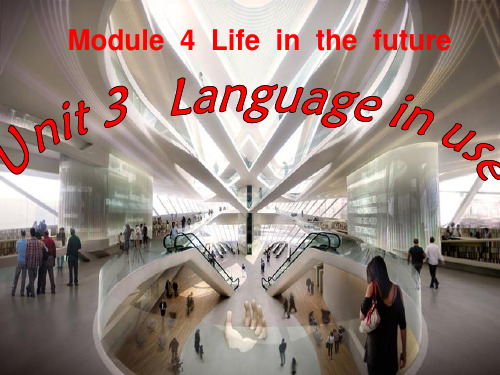
一般将来时(will) 一般将来时表示将来某一时刻/某一 时间段的动作或状态。 句式结构: will+动词原形。
I=我=g将Io骑wtio车ll s去gcoh上oto学ol 。sbcyhoboi第wkl iebl三l.+y人动b称词ik依原e旧形tomorrow. 延伸: He will go to school by bike tomorrow.
2. They will send their homework to the
teacher by email.
否定句:
They won’t send their homework to the teacher by
email. 一般问句:Will they send their homework
3. I __a_m__ (am / will be) free today, so I _w_i_ll_g_o (go / will go) to bed early tonight.
4. Next Monday is Mary’s birthday. Her mother __w_i_ll_g_i_v_e__ (gives / will give) her a present.
4. She is a manager of a theater. (soon) She will be a manager of a theater soon.
5. Li Ming is ten years old. (next year) Li Ming will be ten years old next year.
2. be going to 表示根据主观判断将来肯定发生的 事情, will表示客观上将来势必发生的事情。 He is outstanding. He is going to succeed. He will be twenty years old.
外研社七下模块四重点知识点归纳
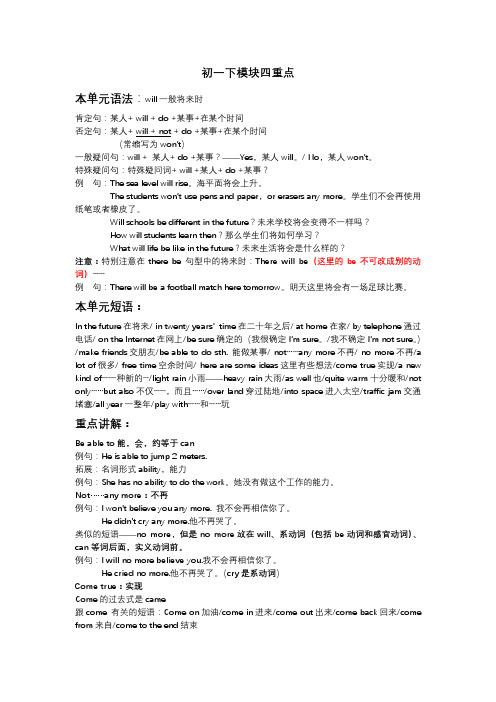
初一下模块四重点本单元语法:will一般将来时肯定句:某人+ will + do +某事+在某个时间否定句:某人+ will + not + do +某事+在某个时间(常缩写为won’t)一般疑问句:will + 某人+ do +某事?——Yes,某人will。
/ No,某人won’t。
特殊疑问句:特殊疑问词+ will +某人+ do +某事?例句:The sea level will rise。
海平面将会上升。
The students won’t use pens and paper,or erasers any more。
学生们不会再使用纸笔或者橡皮了。
Will schools be different in the future?未来学校将会变得不一样吗?How will students learn then?那么学生们将如何学习?What will life be like in the future?未来生活将会是什么样的?注意:特别注意在there be 句型中的将来时:There will be(这里的be不可改成别的动词)……例句:There will be a football match here tomorrow。
明天这里将会有一场足球比赛。
本单元短语:In the future在将来/ in twenty years’time在二十年之后/ at home在家/ by telephone通过电话/ on the Internet在网上/be sure确定的(我很确定I’m sure。
/我不确定I’m not sure。
)/make friends交朋友/be able to do sth. 能做某事/ not……any more不再/ no more不再/a lot of很多/ free time空余时间/ here are some ideas这里有些想法/come true实现/a new kind of…一种新的…/light rain小雨——heavy rain大雨/as well也/quite warm十分暖和/notonly……but also不仅……,而且……/over land穿过陆地/into space进入太空/traffic jam 交通堵塞/all year一整年/play with……和……玩重点讲解:Be able to能,会,约等于can例句:He is able to jump 2 meters.拓展:名词形式ability,能力例句:She has no ability to do the work。
外研版英语七年级下册:Module 4 Unit 3 Language in use. 一般将来时
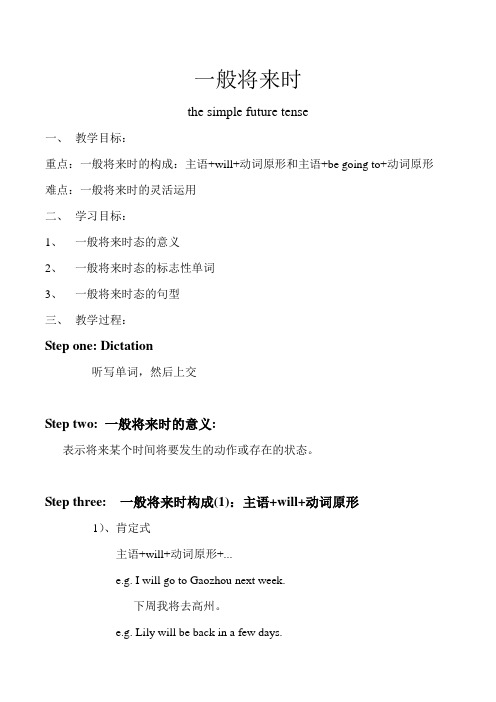
一般将来时the simple future tense一、教学目标:重点:一般将来时的构成:主语+will+动词原形和主语+be going to+动词原形难点:一般将来时的灵活运用二、学习目标:1、一般将来时态的意义2、一般将来时态的标志性单词3、一般将来时态的句型三、教学过程:Step one: Dictation听写单词,然后上交Step two: 一般将来时的意义:表示将来某个时间将要发生的动作或存在的状态。
Step three: 一般将来时构成(1):主语+will+动词原形1)、肯定式主语+will+动词原形+...e.g. I will go to Gaozhou next week.下周我将去高州。
e.g. Lily will be back in a few days.丽丽几天后将回来。
2)、否定式主语+will+not+动词原形+...e.g. I will not go to Gaozhou next week.下周我将不会去高州。
e.g. Lily won’t be back in a few days.丽丽几天后还不会回来。
3)、一般疑问式Will+主语+动词原形+...?A: Will you go to Beijing next week?B: Yes, I will.B: No, I won’t.A: Will Lily be back in a few days?B: Yes, she will.B: No, she won’t.Step four: 常与一般将来时连用的时间状语下次next time明天tomorrow明年next year今天下午this afternoon后天the day after tomorrow不久后a moment later将来in the future明天早上tomorrow morning一小时后In an hourStep five: 一般将来时构成(2):主语+be going to+动词原形1)、表示现在的意图,即打算在最近或不久的将来做某事。
七年级英语下册Module4Lifeinthefuture语法要点语法要点外研版
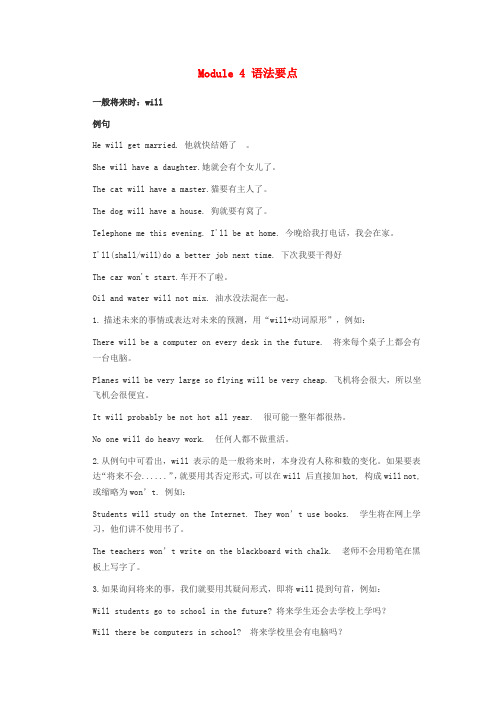
Module 4 语法要点一般将来时:will例句He will get married. 他就快结婚了。
She will have a daughter.她就会有个女儿了。
The cat will have a master.猫要有主人了。
The dog will have a house. 狗就要有窝了。
Telephone me this evening. I'll be at home. 今晚给我打电话,我会在家。
I'll(shall/will)do a better job next time. 下次我要干得好The car won't start.车开不了啦。
Oil and water will not mix. 油水没法混在一起。
1.描述未来的事情或表达对未来的预测,用“will+动词原形”,例如:There will be a computer on every desk in the future. 将来每个桌子上都会有一台电脑。
Planes will be very large so flying will be very cheap. 飞机将会很大,所以坐飞机会很便宜。
It will probably be not hot all year. 很可能一整年都很热。
No one will do heavy work. 任何人都不做重活。
2.从例句中可看出,will 表示的是一般将来时,本身没有人称和数的变化。
如果要表达“将来不会......”,就要用其否定形式,可以在will 后直接加hot, 构成will not, 或缩略为won’t. 例如:Students will study on the Internet. They won’t use books. 学生将在网上学习,他们讲不使用书了。
The teachers won’t write on the blackboard with chalk. 老师不会用粉笔在黑板上写字了。
期中复习-外研版七年级下册Module 3重点内容总结
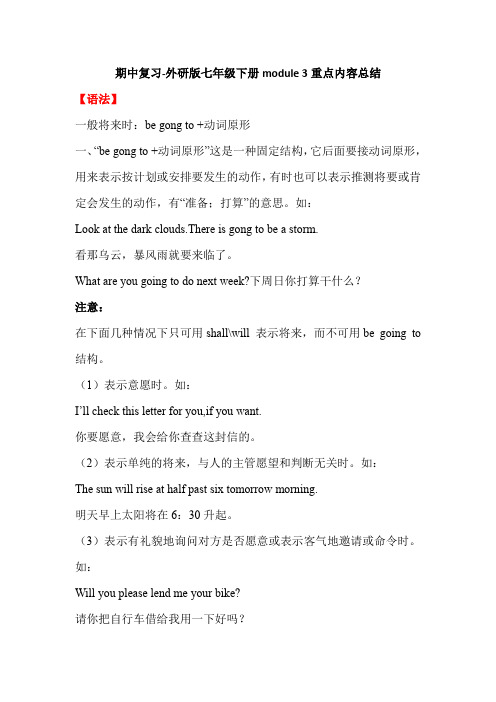
期中复习-外研版七年级下册module 3重点内容总结【语法】一般将来时:be gong to +动词原形一、“be gong to +动词原形”这是一种固定结构,它后面要接动词原形,用来表示按计划或安排要发生的动作,有时也可以表示推测将要或肯定会发生的动作,有“准备;打算”的意思。
如:Look at the dark clouds.There is gong to be a storm.看那乌云,暴风雨就要来临了。
What are you going to do next week?下周日你打算干什么?注意:在下面几种情况下只可用shall\will 表示将来,而不可用be going to 结构。
(1)表示意愿时。
如:I’ll check this letter for you,if you want.你要愿意,我会给你查查这封信的。
(2)表示单纯的将来,与人的主管愿望和判断无关时。
如:The sun will rise at half past six tomorrow morning.明天早上太阳将在6:30升起。
(3)表示有礼貌地询问对方是否愿意或表示客气地邀请或命令时。
如:Will you please lend me your bike?请你把自行车借给我用一下好吗?二、be going to 在句中一般用在其他动词之前。
be 包括am\is\are。
根据be 的句法要求,可以推断出be going to do sth 的否定形式和疑问形式,见下表:肯定否定一般疑问回答I’m going to visit Beijing. I’m not going to visitBeijing.Are you going tovisit Beijing?Yes, I am.No,I’m not.You are going to the park tomorrow. You are not going to thepark tomorrow.Are you going tothe park tomorrow?Yes,you are.No,I’m not.He\She is going to buy some clothes. He\She is not going tobuy some clothes.Is he\she going tobuy some clothes?Yes,he\she is.No,he\she isn’t.It is going to rain. It is not going to rain. Is it going to rain? Yes,it is.No,it isn’t.We are going to have a picnic. We are not going tohave a picnic.Are we going tohave a picnic?Yes,we are.No,we aren’t.They are going to have a party. They are not going tohave a party.Are they going tohave a party?Yes,they are.No,they aren’t.三、be going to的用法总结:(1)含有be going to结构的句子中往往有表示将来的时间状语。
外研版七年级下册Module3语法知识点复习和练习(无答案)
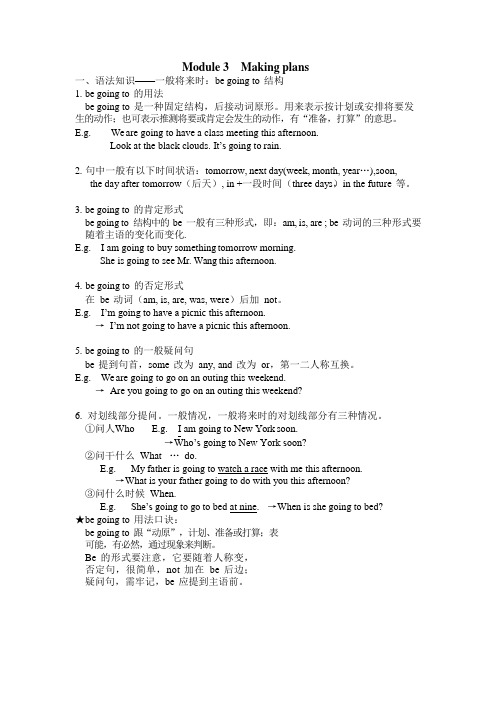
Module 3 Making plans一、语法知识——一般将来时:be going to 结构1.be going to 的用法be going to 是一种固定结构,后接动词原形。
用来表示按计划或安排将要发生的动作;也可表示推测将要或肯定会发生的动作,有“准备,打算”的意思。
E.g. W e are going to have a class meeting this afternoon.Look at the black clouds. It’s going to rain.2.句中一般有以下时间状语:tomorrow, next day(week, month, year…),soon,the day after tomorrow(后天), in +一段时间(three day s),in the future 等。
3.be going to 的肯定形式be going to 结构中的be 一般有三种形式,即:am, is, are ; be 动词的三种形式要随着主语的变化而变化.E.g. I am going to buy something tomorrow morning.She is going to see Mr. Wang this afternoon.4.be going to 的否定形式在be 动词(am, is, are, was, were)后加not。
E.g. I’m going to have a picnic this afternoon.→ I’m not going to have a picnic this afternoon.5.be going to 的一般疑问句be 提到句首,some 改为any, and 改为or,第一二人称互换。
E.g. We are going to go on an outing this weekend.→ Are you going to go on an outing this weekend?6.对划线部分提问。
外研版七年级下册MODULE34专项语法一般将来时

一般将来时讲解及练习题一、构成由“助动词will + 动词原形”构成,当主语是第一人称时,也可以用“助动词shall +动词原形”。
will 在名词或代词后常缩写为'll,will not缩写为won’t;shall一般不缩写,shall not缩写为shan’t。
例如:He will help his sister with her lessons.他将帮助他妹妹做功课。
We shall/will not be free this afternoon.今天下午我们没空。
一般将来时表示在将来的某个时候将要发生的动作或存在的状态,常与tomorrow, next year, in a minute等时间状语连用。
二、用法:一般将来时表示将要发生的动作或存在的状态以及计划、打算做某事。
例句:They will have a football match tomorrow.He will be thirty next week.She is going to buy a coat this afternoon.1.其结构有如下几种:1)will + 动词原形(will可以用于任何人称) shall+ 动词原形需要注意的是当主语是第一人称时will可以换成shall,特别是在以I或we作主语的问句中,一般用shall. 如:. Shall we go to the zoo?2)be going to +动词原形3)表示位置移动的词如come, go , leave, fly 等用现在进行时也可表示将来,2.变否定句:1)在will后边加not. 变一般疑问句把will提前. 例如:She will be back in three days.She will not be back in three days.Will She be back in three days?2)在be后边加not.。
外研版英语七年级-一般将来时

一般将来时一、定义表示将来某个时间要发生的动作,事情或存在的状态,也表示将来经常或反复发生的动作或事情。
常用的时间状语:tomorrow morning /afternoon/evening(明天早、中、晚), the day after tomorrow(后天),next year(明年) ,next month(下一个月) ,next week(下一个星期) , soon(不久) ,later on过些时间, this afternoon(今天下午) , in+段时间( in 2020 在2020年)............二、构成及变化一般将来时常用的两种结构:$be going to+do : 表示打算、计划做某事或有意做某事。
shall/will+do :描述未来的事情或表达对将来的预测等。
三、will与be going to 的区别1.be going to 表示根据主观判断将来肯定发生的事情,will表示客观上将来势必发生的事情。
E.g: I'm going to play football tomorrow afternoon.He will be twenty years old.2.be going to 含有“计划,准备”的意思,而 will 则没有这个意思。
—E.g: She is going to lend us her book.He will be here in half an hour.3.be going to 表示有迹象要发生的事,will没有。
E.g: Look at the dark clouds, there is going to be a storm. 看那乌云,快要下雨了。
四、要点注意1. 使用现在进行时表示将来的动词:go,come,arrive,leave,fly(飞往),reach(到达),stay,start, die...E.g: I’m going to go to the zoo this weekend.= I’m going to the zoo this weekend.-He’s going to leave for Paris.= He’s leaving for Paris.2.使用一般现在时表将来的动词:come, go, arrive, leave, start, begin, return...表示在时间上已确定或安排好的事情。
初中英语外研版七年级下册M4U3预习指导(知识点+练习题)
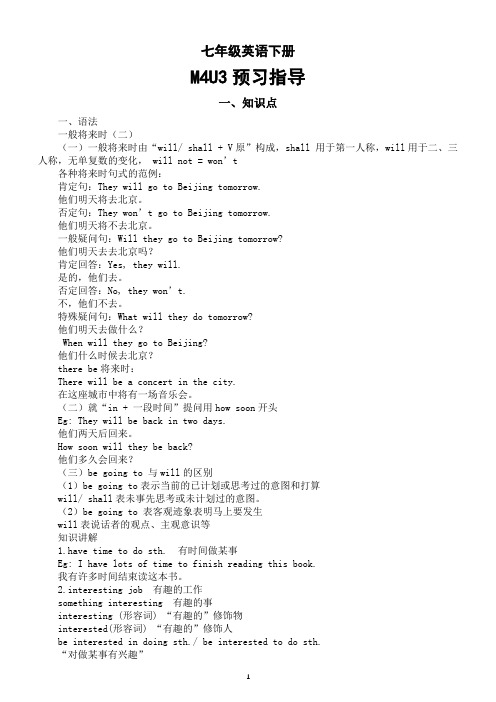
七年级英语下册M4U3预习指导一、知识点一、语法一般将来时(二)(一)一般将来时由“will/ shall + V原”构成,shall 用于第一人称,will用于二、三人称,无单复数的变化, will not = won’t各种将来时句式的范例:肯定句:They will go to Beijing tomorrow.他们明天将去北京。
否定句:They won’t go to Beijing tomorrow.他们明天将不去北京。
一般疑问句:Will they go to Beijing tomorrow?他们明天去去北京吗?肯定回答:Yes, they will.是的,他们去。
否定回答:No, they won’t.不,他们不去。
特殊疑问句:What will they do tomorrow?他们明天去做什么?When will they go to Beijing?他们什么时候去北京?there be将来时:There will be a concert in the city.在这座城市中将有一场音乐会。
(二)就“in + 一段时间”提问用how soon开头Eg: They will be back in two days.他们两天后回来。
How soon will they be back?他们多久会回来?(三)be going to 与will的区别(1)be going to表示当前的已计划或思考过的意图和打算will/ shall表未事先思考或未计划过的意图。
(2)be going to 表客观迹象表明马上要发生will表说话者的观点、主观意识等知识讲解1.have time to do sth. 有时间做某事Eg: I have lots of time to finish reading this book.我有许多时间结束读这本书。
2.interesting job 有趣的工作something interesting 有趣的事interesting (形容词) “有趣的”修饰物interested(形容词) “有趣的”修饰人be interested in doing sth./ be interested to do sth.“对做某事有兴趣”Eg:I’m interested in speaking English.= I’m interested to speak English.我对说英语有兴趣。
外研版七年级英语下册Module 4复习一般将来时 will课件(11张ppt)

4. They have never been to Beijing. They’re going there to __C__. A. go shopping B. go fishing C. go sightseeing D. go cycling
Beijing 2008 Olympic Games.
A. watched B. watches
C. watch
D. watchinBg
7. We are looking forward to_______ you来自soon.A.meet
B. meeting
不习惯读书进修的人,常会自满于现状,觉得再没有什么事情需要学习,于是他们不进则退。经验丰富的人读书用两只眼睛,一只眼睛看到纸面上的话,另 一眼睛看到纸的背面。2022年4月3日星期日2022/4/32022/4/32022/4/3 书籍是屹立在时间的汪洋大海中的灯塔。2022年4月2022/4/32022/4/32022/4/34/3/2022 正确的略读可使人用很少的时间接触大量的文献,并挑选出有意义的部分。2022/4/32022/4/3April 3, 2022 书籍是屹立在时间的汪洋大海中的灯塔。
_____________(have) a haircut at the
Choose the best answer.
1. Mary is going to__A__ her email this evening. A. check B. look C. watch D. see
2. Tom is looking forward to __C_ the new film. A. see B. to see C. seeing D. sees
期中复习-外研版七年级下册Module 4重点内容复习总结
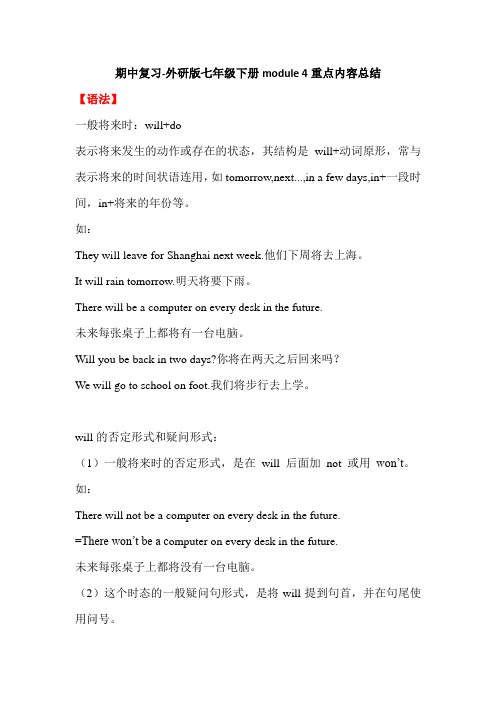
期中复习-外研版七年级下册module 4重点内容总结【语法】一般将来时:will+do表示将来发生的动作或存在的状态,其结构是will+动词原形,常与表示将来的时间状语连用,如tomorrow,next...,in a few days,in+一段时间,in+将来的年份等。
如:They will leave for Shanghai next week.他们下周将去上海。
It will rain tomorrow.明天将要下雨。
There will be a computer on every desk in the future.未来每张桌子上都将有一台电脑。
Will you be back in two days?你将在两天之后回来吗?We will go to school on foot.我们将步行去上学。
will的否定形式和疑问形式:(1)一般将来时的否定形式,是在will 后面加not 或用won’t。
如:There will not be a computer on every desk in the future.=There won’t be a c omputer on every desk in the future.未来每张桌子上都将没有一台电脑。
(2)这个时态的一般疑问句形式,是将will提到句首,并在句尾使用问号。
肯定回答用will,否定回答用缩略式won’t。
当主语是I或we时,疑问句中一般使用shall,表示征求对方意见。
如:Where shall we meet tomorrow?明天我们在哪里见面?will表示的是一般将来时,本身没有人称和数的变化。
下面将will的句式总结如下:即:肯定句是:主语+will +动词原形否定句是:主语+will not (won’t)+动词原形一般疑问句是:Will +主语+动词原形?【重点语句】need意为“需要”,既可用作实义动词,也可用作情态动词。
(完整版)外研版年七年级下册MODULE3-4专项语法--一般将来时
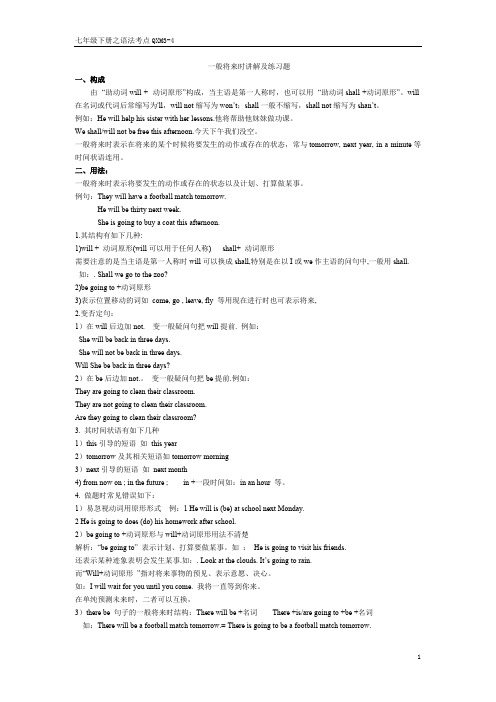
一般将来时讲解及练习题一、构成由“助动词will + 动词原形”构成,当主语是第一人称时,也可以用“助动词shall +动词原形”。
will 在名词或代词后常缩写为'll,will not缩写为won’t;shall一般不缩写,shall not缩写为shan’t。
例如:He will help his sister with her lessons.他将帮助他妹妹做功课。
We shall/will not be free this afternoon.今天下午我们没空。
一般将来时表示在将来的某个时候将要发生的动作或存在的状态,常与tomorrow, next year, in a minute等时间状语连用。
二、用法:一般将来时表示将要发生的动作或存在的状态以及计划、打算做某事。
例句:They will have a football match tomorrow.He will be thirty next week.She is going to buy a coat this afternoon.1.其结构有如下几种:1)will + 动词原形(will可以用于任何人称) shall+ 动词原形需要注意的是当主语是第一人称时will可以换成shall,特别是在以I或we作主语的问句中,一般用shall.如:. Shall we go to the zoo?2)be going to +动词原形3)表示位置移动的词如come, go , leave, fly 等用现在进行时也可表示将来,2.变否定句:1)在will后边加not. 变一般疑问句把will提前. 例如:She will be back in three days.She will not be back in three days.Will She be back in three days?2)在be后边加not.。
外研版英语七年级下册:Module 4 Unit 3 Language in use. 一般将来时态
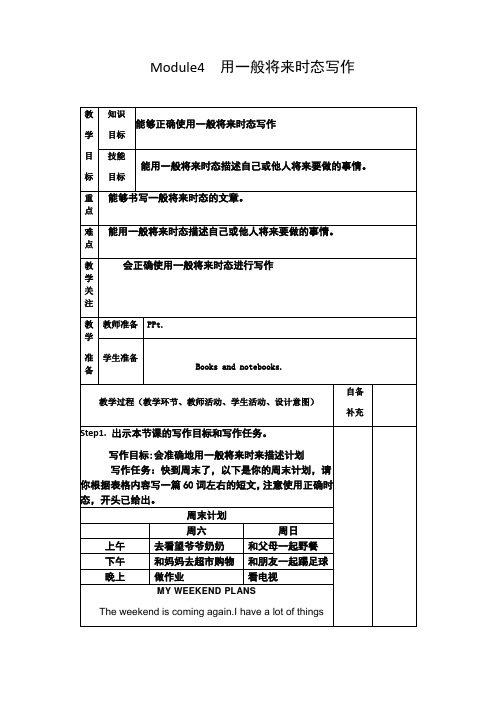
Step12.Homework:暑假将至,同学们就自己暑假生活安排进行了交流。请你用英语向美籍教师Mr Brown介绍有关情况以及自己的暑期计划。词数60-80左右。
内容应包括以下要点:
1.有的同学打算去探访一些名胜古迹(places of interest)。
2.有的同学计划在家中多读书,为将来的学习做准备。
课后反思
围绕本课达成目标、教学方式、学习方式、课程资源的开发与利用等进行反思
1.学生单词不够熟悉,词组搭配错误,应强调学生多记忆。
2.学生英语写作出现汉语式思维,应多训练简单句的五种基本句式。
教学过程(教学环节、教师活动、学生活动、设计意图)
Байду номын сангаас自备
补充
Step1.出示本节课的写作目标和写作任务。
写作目标:会准确地用一般将来时来描述计划
写作任务:快到周末了,以下是你的周末计划,请你根据表格内容写一篇60词左右的短文,注意使用正确时态,开头已给出。
周末计划
周六
周日
上午
去看望爷爷奶奶
和父母一起野餐
Module4用一般将来时态写作
教
学
目
标
知识
目标
能够正确使用一般将来时态写作
技能
目标
能用一般将来时态描述自己或他人将来要做的事情。
重点
能够书写一般将来时态的文章。
难点
能用一般将来时态描述自己或他人将来要做的事情。
教学关注
会正确使用一般将来时态进行写作
教学
准备
教师准备
PPt.
学生准备
Books and notebooks.
Step4.添加主语、谓语动词的正确形式和其他成份,连词成句。
外研版七年级下册英语重点语法规则总结

外研版七年级下册英语重点语法规则总结1. 一般现在时(Simple Present Tense)- 表示经常性或惯性的动作、客观事实、真理和感受等。
- 动词原形加-s或-es。
- 如:I play football every day.(我每天踢足球。
)2. 一般过去时(Simple Past Tense)- 表示过去某个时间发生的动作或状态。
- 动词过去式的变化规则。
- 如:She studied English yesterday.(她昨天学了英语。
)3. 一般将来时(Simple Future Tense)- 表示将来会发生的动作或状态。
- 使用"will"或“be going to”加动词原形。
- 如:I will go to the park tomorrow.(我明天会去公园。
)4. 现在进行时(Present Continuous Tense)- 表示现在正在进行的动作。
- 使用be动词的现在分词形式加动词-ing。
- 如:They are watching a movie now.(他们现在正在看电影。
)5. 过去进行时(Past Continuous Tense)- 表示过去某个时间正在进行的动作。
- 使用be动词的过去分词形式加动词-ing。
- 如:He was studying when I called him.(我打电话时他正在研究。
)6. 现在完成时(Present Perfect Tense)- 表示过去发生的动作对现在造成的影响。
- 使用have/has加动词的过去分词形式。
- 如:I have seen that movie before.(我以前看过那部电影。
)7. 过去完成时(Past Perfect Tense)- 表示在过去某个时间之前已经发生或完成的动作。
- 使用had加动词的过去分词形式。
- 如:He had already finished his homework before the party started.(派对开始前他已经完成了作业。
外研版七年级下册module3-4专项语法--一般将来时
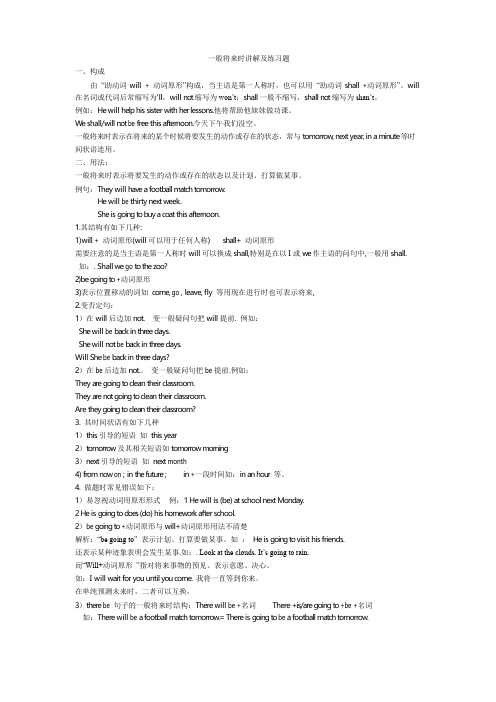
一般将来时讲解及练习题一、构成由“助动词will+动词原形”构成,当主语是第一人称时,也可以用“助动词shall+动词原形”。
will 在名词或代词后常缩写为'll,will n o t缩写为won’t;shall一般不缩写,shall no t缩写为shan’t。
例如:He will help his sister with her lessons.他将帮助他妹妹做功课。
W e shall/will n ot be free this afternoon.今天下午我们没空。
一般将来时表示在将来的某个时候将要发生的动作或存在的状态,常与tomorrow,next year,in a minute等时间状语连用。
二、用法:一般将来时表示将要发生的动作或存在的状态以及计划、打算做某事。
例句:They will have a football mat ch tomorrow.He will be thirty next week.She is going t o buy a coat this afternoon.1.其结构有如下几种:1)will+动词原形(will可以用于任何人称)shall+动词原形需要注意的是当主语是第一人称时will可以换成shall,特别是在以I或we作主语的问句中,一般用shall.如:.Shall we go t o t he zoo?2)be going t o+动词原形3)表示位置移动的词如come,go,leave,fly等用现在进行时也可表示将来,2.变否定句:1)在will后边加not.变一般疑问句把will提前.例如:She will be back in thr ee days.She will n ot be back in thr ee days.Will She be back in thr ee days?2)在be后边加not.。
变一般疑问句把be提前.例如:They are going t o clean their classroom.They are no t going t o clean their classroom.Are they going t o clean their classroom?3.其时间状语有如下几种1)this引导的短语如this year2)tomorr ow及其相关短语如tomorr ow morning3)next引导的短语如next month4)from now on;in t h e future;in+一段时间如:in a n hour等。
外研社七下Module4 Unit3 Language in use知识精讲

外研社七下M4U3Language in use知识精讲一般将来时:will考向一【重点】“will +动词原形”是一般将来时最常见的形式,它表示单纯的将来,不表示计划、打算,可以用于各种人称。
注意be going to 侧重经过事先考虑过的意图、计划、打算等,或指有迹象表明某事即将发生或肯定发生。
考向二【重点】will构成的一般将来时的句型结构:I ________ Chinese dishes for my foreign friends tomorrow evening. A.will cook B.have cookedC.cook D.cooked考向三一般将来时常用的时间状语:tomorrow明天,the day after tomorrow后天,soon不久,next week/Monday/.../Sunday/month/year下周/周一/……/周日/个月/一年,in two days/weeks/...两天/周/……后They say that it ________ good weather tomorrow.A.was B.has beenC.will be D.be记忆will的用法will欲把将来谈,动词原形紧相连;否定形式为won't,疑问句式will提前;句末状语表将来,“in+时间段”常相伴。
知识点[高频]send sth.to sb.发送某物给某人考向send sth . to sb . 相当于send sb . sth . 其中send作动词时,还可意为“派遣,打发”。
eg:I’ll send some photos to Mary .=I’ll send Mary some photos .我将要寄给玛丽一些照片。
She sends her kids to bed early .她早早打发孩子们上床睡觉。
拓展与send有关的词组His leg is seriously injured in the accident . ________a doctor at once . A.Ask for B.Send forC.Wait for D.Look for同义句改写:My friend often sends me emails .My friend often ______ _______ _____ _____ .语法小练习一、用所给词的适当形式填空1.People ____________ (have) more free time in the future. 2.—What ________ Jack ________(do)tomorrow?—He'll watch a football match.3.________ there ________ (be) a strong wind tomorrow?4.Tim ____________(be) ten years old next year.5.Maybe nobody knows what ________________(happen) in a hundred years.二、单项选择6.I still remember my happy childhood when my mother ________me to Disneyland at weekends.A.takes B.tookC.will take D.has taken7.If it ________ rain tomorrow,we'll go hiking.A.won't B.doesn't C.don't D.didn't8.With the development of science and technology, robot cooks ________ in our families in the future.A.appear B.appearedC.will appear D.were appearing 9.—There ________a basketball game in our school tomorrow.—Great!A.is going to have B.will beC.be D.will have10.Please wait . She ________to you in a few minutes.A.talk B.talkedC.have talked D.will talk答案1.will have 2.will do 3.will be 4.will be 5.will happen 6-10BBCBD。
- 1、下载文档前请自行甄别文档内容的完整性,平台不提供额外的编辑、内容补充、找答案等附加服务。
- 2、"仅部分预览"的文档,不可在线预览部分如存在完整性等问题,可反馈申请退款(可完整预览的文档不适用该条件!)。
- 3、如文档侵犯您的权益,请联系客服反馈,我们会尽快为您处理(人工客服工作时间:9:00-18:30)。
一般将来时讲解及练习题一、构成由“助动词will + 动词原形”构成,当主语是第一人称时,也可以用“助动词shall +动词原形”。
will 在名词或代词后常缩写为'll,will not缩写为won’t;shall一般不缩写,shall not缩写为shan’t。
例如:He will help his sister with her lessons.他将帮助他妹妹做功课。
We shall/will not be free this afternoon.今天下午我们没空。
一般将来时表示在将来的某个时候将要发生的动作或存在的状态,常与tomorrow, next year, in a minute等时间状语连用。
二、用法:一般将来时表示将要发生的动作或存在的状态以及计划、打算做某事。
例句:They will have a football match tomorrow.He will be thirty next week.She is going to buy a coat this afternoon.1.其结构有如下几种:1)will + 动词原形(will可以用于任何人称) shall+ 动词原形需要注意的是当主语是第一人称时will可以换成shall,特别是在以I或we作主语的问句中,一般用shall. 如:. Shall we go to the zoo?2)be going to +动词原形3)表示位置移动的词如come, go , leave, fly 等用现在进行时也可表示将来,2.变否定句:1)在will后边加not. 变一般疑问句把will提前. 例如:She will be back in three days.She will not be back in three days.Will She be back in three days?2)在be后边加not.。
变一般疑问句把be提前.例如:They are going to clean their classroom.They are not going to clean their classroom.Are they going to clean their classroom?3. 其时间状语有如下几种1)this引导的短语如this year2)tomorrow及其相关短语如tomorrow morning3)next引导的短语如next month4) from now on ; in the future ; in +一段时间如:in an hour 等。
4. 做题时常见错误如下:1)易忽视动词用原形形式例:1 He will is (be) at school next Monday.2 He is going to does (do) his homework after school.2)be going to +动词原形与will+动词原形用法不清楚解析:“be going to” 表示计划、打算要做某事。
如:He is going to visit his friends.还表示某种迹象表明会发生某事.如:. Look at the clouds. It’s going to rain.而“Will+动词原形”指对将来事物的预见、表示意愿、决心。
如:I will wait for you until you come. 我将一直等到你来。
在单纯预测未来时,二者可以互换,3)there be 句子的一般将来时结构:There will be +名词There +is/are going to +be +名词如:There will be a football match tomorrow.= There is going to be a football match tomorrow.There will be two films next week. = There are going to be two films next week.一般将来时专项训练一、选择题。
( ) 1. ---Let’s go out to play football, shall we? ---OK. I ________.A. will comingB. be going to comeC. comeD. am coming( ) 2. Charlie ________ here next month.A. isn´t workingB. doesn´t workingC. isn´t going to workingD. won´t work ( ) 3. He ________ very busy this week, he ________ free next week.A. will be; isB. is; isC. will be; will beD. is; will be( ) 4. There ________ two dolphin shows in the zoo tomorrow evening.A. wasB. is going to beC. will haveD. are going to be( ) 5.---___ you ___ free tomorrow? ---No. I ___ free the day after tomorrow.A. Are; going to; willB. Are; going to be; willC. Are; going to; will beD. Are; going to be; will be( ) 6. Mother ________ me a nice present on my next birthday.A. will givesB. will giveC. givesD. give( ) 7. The train ________ at 11.A. going to arriveB. will be arriveC. is going toD. is arriving( ) 8.---Where is the morning paper? ---I ________ it for you at once.A. getB. am gettingC. to getD. will get( ) 9. ________ a concert next Saturday?A. There will beB. Will there beC. There can beD. There are( ) 10. If they come, we ________ a meeting.A. haveB. will haveC. hadD. would have( ) 11. He ________ her a beautiful hat on her next birthday.A. givesB. gaveC. will givingD. is going to giving( ) 12. He ________ to us as soon as he gets there.A. writesB. has writtenC. will writeD. wrote( ) 13. He ________ in three days.A. coming backB. came backC. will come backD. is going to coming back ( ) 14. If it ________ tomorrow, we’ll go skating.A. isn´t rainB. won´t rainC. doesn´t rainD. doesn´t fine( ) 15.---Will his parents go to see the Terra Cotta Warriors tomorrow? ---No, _______ .A. they willn’t.B. they won’t.C. they aren’t.D. they don’t.( ) 16. Who ________ we ________ swimming with tomorrow afternoon?A. will; goB. do; goC. will; goingD. shall; go( ) 17. We ________ the work this way next time.A. doB. will doC. going to doD. will doing( ) 18. Tomorrow he _____ a kite in the open air first, and then _____ boating in the park.A. will fly; will goB. will fly; goesC. is going to fly; will goesD. flies; will go ( ) 19. The day after tomorrow they ________ a volleyball match.A. will watchingB. watchesC. is watchingD. is going to watch( ) 20. There ________ a birthday party this Sunday.A. shall beB. will beC. shall going to beD. will going to be( ) 21. They ________ an English evening next Sunday.A. are havingB. are going to haveC. will havingD. is going to have( ) 22. ________ you ________ free next Sunday?A. Will; areB. Will; beC. Do; beD. Are; be( ) 23. He ________ there at ten tomorrow morning.A. willB. isC. will beD. be( ) 24. ________ your brother ________ a magazine from the library?A. Are; going to borrowB. Is; going to borrowC. Will; borrowsD. Are; going to borrows( ) 25. It ________ us a long time to learn English well.A. takesB. will takeC. spendsD. will spend( ) 26. It ________ the year of the horse next year.A. is going to beB. is going toC. will beD. will is( ) 27. ________ open the window?A. Will you pleaseB. Please will youC. You pleaseD. Do you二、动词填空。
